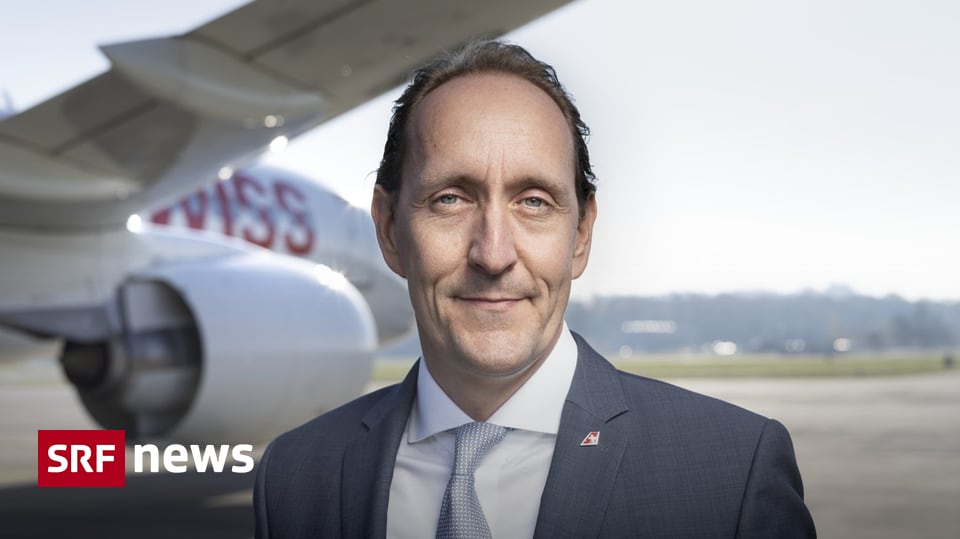Summer holidays are just around the corner. That means: Many travelers fly far away. Swiss CEO Dieter Vranckx talks about the goals for this summer, sustainability and the aviation industry’s failure to invest in sustainable technology earlier.
Open the people box Close the people box
The Belgian-Swiss dual citizen has held various management positions in the airline industry since 1998. From 2013 to 2016 he was Head of Sales and Marketing at Swiss for the Swiss, German and Austrian markets. Vranckx lives in the canton of Zurich, is married and has two children.
SRF News: Dieter Vranckx, what can you do to guarantee a smooth flight?
Dieter Vranckx: With a reliability of 99 percent in the summer of 2022, Swiss was one of the most reliable airlines. Our goal for this summer is to maintain this value.
Legend: Swiss boss Dieter Vranckx is convinced that sustainable fuels will greatly reduce CO₂ emissions. KEYSTONE/Gaetan Bally
At the end of last year, we informed our partner airport in Zurich about our traffic figures. This process is to ensure that all parties have enough time to prepare for the summer rush and that everything can run smoothly.
What are the booking figures for this summer?
Demand continues to be strong. Our aircraft are very well utilized. We have responded to this trend by offering 15 percent more flights this summer compared to 2022.
Since February, Swiss has been offering a “green tariff” on all European flights. What do you do with the additional income?
There are three actions we are taking to go green. The first is investing in new aircraft. Each new aircraft reduces CO₂ emissions by 20 percent. The second lever is sustainable fuels. These are of incredible importance. But they are also four to six times more expensive than normal kerosene.
Swiss has set itself the goal of achieving net zero by 2050.
The third measure is investing in new technologies; For example, the “Sharkskin” technology. This is a new type of microfilm that will be stuck on our long-haul aircraft. By reducing air resistance, we were able to save 15,000 tons of CO₂ last year.
It turns out that only three percent of passengers pay the “green tariff”. Isn’t this frustrating?
Sure, three percent is not enough. But we come from one percent, which means that sales of the “green tariff” have tripled. Our goal now is to further increase the three percent. At some point we will also introduce routes on which Swiss will only fly with this tariff. That will certainly not be tomorrow or the day after tomorrow, but we are developing in this direction.
Environmental psychologist: Conscience flies with you
Open box Close box
Can we still fly with a clear conscience? No, says environmental psychologist and sustainability researcher Thomas Brudermann from the University of Graz. The focus of his research is on human decision-making behavior.
“Most people are climate-friendly. However, the attitudes do not always match the behavior that we display in everyday life,” says Brudermann. “The problem lies in the perception of effectiveness. We separate the rubbish, we turn off the lights, we use fewer plastic bags and think this compensates for our holiday flight in the summer.”
A flight to Bali emits around ten tons of CO₂ per person. Thomas Brudermann has calculated that “for the same amount of CO₂ emissions with the Swiss electricity mix, I could leave my lights on for 300 years or use three to four plastic bags a day until the end of my life”.
It has long been known that aviation is a major driver of global warming. Why didn’t the aviation industry invest in sustainable technologies much earlier?
Of course it would have been better if we had started earlier. But the same question can be asked in many subject areas. That’s why it’s important for me to look ahead: What options do we have today that we can take a big step further in five to ten years? Swiss has set itself the goal of reducing CO₂ emissions by 50 percent by 2030 and achieving net zero by 2050. I prefer to deal with the question of which decisions Swiss must now make in order to achieve our goals.
The conversation was conducted by David Karasek.
